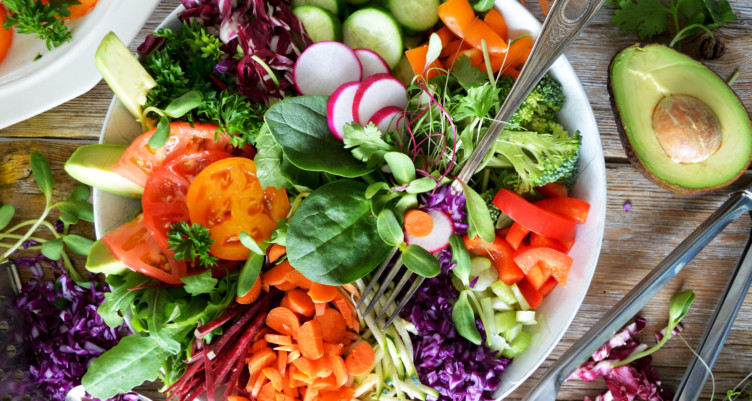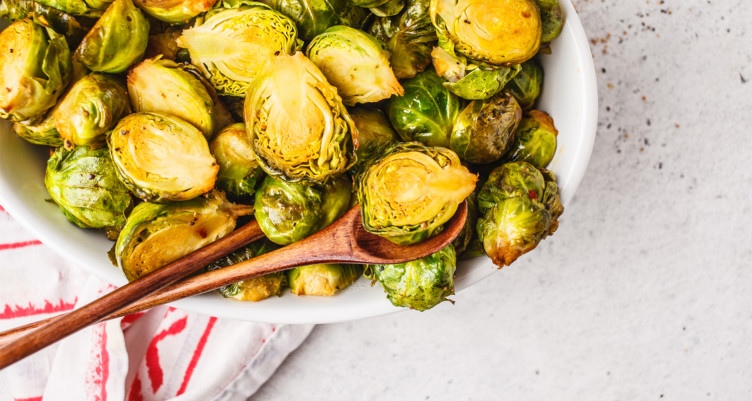7 Ways to Avoid Winter Weight Gain, According to Experts

- Worried about winter weight gain? We asked experts for their advice to help you stick to your wellness goals.
- No surprise here: Whether you’re eating out or dining with friends, fill your plate with nutrient-dense, whole foods, and keep the treats (and alcohol) to a minimum.
- Can’t stomach working out in the cold? You’ll find tips to think outside the box and stay active throughout the day.
- Plus, recipes for party-friendly foods that won’t wreck your diet (but still taste amazing).
Thanks to cooler temperatures and food-centric holidays, sticking to your weight loss goals in the fall and winter can feel like an uphill battle. Worried about winter weight gain? Keep reading for seven expert tips to help you stay on track this season.
How to stick to your wellness goals this winter
Generally, you gain weight when you eat more calories than you burn. According to Elliott Upton, NASM-certified personal trainer at Ultimate Performance, “If we are gaining weight during the winter months, we are likely to be over-consuming calories or being underactive.” Here are a few ways to stay balanced:
1. Prioritize whole foods

Candy, cookies and pie might taste amazing, but they probably won’t help you feel your best if you eat them in excess. Whether you’re grabbing lunch with friends or enjoying a holiday dinner, enjoy nutrient-dense, whole foods, and keep the treats to a minimum. That means filling half your plate with a variety of vegetables (think green veggies, not french fries), and fill the rest of your plate with a moderate amount of protein and carbohydrates. For an easy visual guide, follow the foods in the green zone on the Bulletproof Diet Roadmap.
If you’re dining out at a restaurant, Upton says you can always ask the restaurant if they can make any alterations to dishes or swap our ingredients — like swapping fries for a salad. “Ensure you are constantly well-hydrated with water,” he adds, which will help manage hunger and avoid mistaking thirst for food cravings.
Related: What to do when you’ve had too much sugar
2. Get plenty of sleep (and sunshine)

Research suggests that sleep loss might increase your risk of weight gain by affecting your appetite, making you more likely to reach for higher-calorie foods.[1] Plus, shorter days in the winter means less sunshine — which may negatively impact sleep quality.
What does that have to do with winter weight gain? According to Candice Seti, PsyD, a licensed clinical psychologist and certified personal trainer, “As the days get shorter and we move into Daylight Savings Time, sleep can be impacted by these changes to daylight hours.” Those changes may affect your circadian rhythm — your body’s natural sleep-wake cycle.
Fortunately, you can take steps to improve your sleep quality by limiting blue light exposure, sleeping in a pitch-black room and avoiding caffeine more than six to eight hours before bed, says Upton. Get tips to help boost your sleep quality.
Having trouble sleeping, or just not feeling rested? Get the Bulletproof Sleep Guide and start the Bulletproof Sleep Challenge
3. Maintain your exercise routine

When it’s chilly outside, the last thing you might want to do is strap on your running shoes and do some hill sprints. But don’t let that stop you from being active, says Seti. Exercise outside the box and join a new yoga studio or an indoor basketball or volleyball league. Move your nighttime weight session to the morning. Or find a gym buddy who can hold you accountable. “The point is to just keep your body active and healthy this winter,” Seti says.
4. Move throughout the day

Exercising a few times a week is great, but it’s even better to make sure that you’re moving and active throughout the day. According to Upton, your daily activity levels are arguably the biggest contributor to how much overall energy you burn. This concept is called NEAT (non-exercise activity thermogenesis).[2]
“Simply walking around, doing DIY, walking to the store or playing with the kids in the yard can substantially increase your energy expenditure, and therefore weight loss,” Upton says. To get started, set a daily step target and stick to it — even when the weather is especially frightful.
5. Make your own food

You want to enjoy yourself at your neighbor’s Halloween party, but you don’t know if they’ll have food that fits your personal goals. The solution? Make your own delicious dishes. Here are a few party recipe ideas to get started:
Mains and sides:
- Spinach empanadas
- Bacon-avocado Caesar deviled eggs
- Paleo beef meatballs
- Paleo sweet potato and salmon patties
- Keto slow cooker beef stew
Desserts:
- Bulletproof pumpkin pie
- Gluten-free pumpkin spice doughnuts
- Chocolate chip peppermint cookies
- Chocolate-covered bacon
- Keto lemon bars
- Easy keto white truffles
Get more free recipe ideas by checking out our Recipes section, or join our recipe newsletter to get them sent straight to your inbox!
6. Cut back on alcohol

Planning on having a few drinks at your next get-together? Be mindful of your consumption, says Upton. “A [beer] contains 145 calories, so even enjoying four [beers] will add nearly 600 extra calories to your daily total.” Plus, alcohol has been shown to spike insulin levels — and when your blood sugar drops, you’ll likely be left hungry and craving calorie-dense foods.[3]
So, what can you do? Limit your alcohol intake, and when you do drink, Upton recommends these steps:
- Ensure you’ve worked out that day
- Eat balanced meals throughout the day
- Stick to lower-calorie clear spirits, like vodka
Related: Will drinking kick you out of ketosis?
7. Don’t sweat the small stuff

As if the holidays weren’t stressful enough, studies suggest that stress may contribute to weight gain.[4] Stress contributes to high levels of cortisol, your stress hormone.[5] [6] Higher cortisol levels are associated with larger waist circumference and body mass index.[7] Stress may also make you want to reach for hyperpalatable comfort foods — specifically, foods that are high in fat and sugar.[8] [9]
To manage stress, Seti recommends building personal toolkit by focusing on all of the things that make you feel calm and relaxed. “This toolkit can include things like meditation, baths, journaling, spending time in nature, talking to a friend, doing art activities, listening to music, stretching, volunteering, exercising, playing games or puzzles, reading or anything else that makes you feel calm and good,” she says. “The most important part is that you prioritize the time to do these things regularly.”
Make wellness a lifelong habit

Still worried about winter weight gain? You might have heard the claim that the average American gains five pounds over the holidays. Research suggests the numbers aren’t quite as extreme: a 2015 study found that participants only gained about a pound on average between late September and March.[10] The tips above aren’t just limited to fall and winter — they’re great principles to help you stick to your weight loss goals all year long. After all, healthy choices aren’t seasonal: They’re habits you build every day, and today is a great day to get started.
Sign up for early access to sales, product launches, the latest Bulletproof news and more!



